X-Men: Days of Future Past works best as a paean for sixties optimism. A little bloated and messy, with not enough room for all its characters or side plots, X-Men: Days of Future Past could do with a trim or three. At the same time, it’s a very thoughtful and reflective blockbuster, pondering questions about innocence and idealism. There’s a sense that X-Men: Days of Future Past works better as a sequel to X-Men: First Class than it does an epilogue and critique of X-Men III.
The last few X-Men films have managed to craft an interesting pop history of the twentieth century, offering commentary and twists on the big cultural moments. (Even the post-credits teaser plays with the idea of pulp history.) Rather clumsily, X-Men Origins: Wolverine provided a pointless alternate cause for Three Mile Island. However, the two most recent X-Men films have done a much better job. X-Men: First Class obvious set itself against the beady backdrop of the Cuban Missile Crisis and the Civil Rights movement.
X-Men: Days of Future Past exists in the space between Vietnam and Watergate. The bulk of the movie unfolds in 1973, several years after the end of X-Men: First Class. The dream is dead. The Xavier Mansion is closed. Charles Xavier is a recluse, living with his only young male friend and enabler, a former student named “Beast.” Asked to explain what happened, and how things could have gone so wrong so fast, Beast explains that the school had the misfortune to open a few months before the outbreak (and draft) of the Vietnam War.
“It broke him,” Hank offers, explaining how Xavier watched a young generation sacrificed to a pointless overseas conflict. Much like the real-life minorities who served in Vietnam, the mutant soldiers receive little in the way of thanks for their effort. They risk their lives in the service of American ideals, and return home to a country that still hates (or just ignores) them. One of the nicer cuts towards the end of the film reveals the fates of the mutant soldiers who did make it home after the end of the war; drinking in dive bars or working dead-end jobs.
It’s no wonder that Xavier has given up on his dream. An early scene with the younger version of the professor reveals him shooting up to help dull the pain, to forget his gifts and his empathy and his hope. Xavier’s sole ambition is to “pass”, to blend into the background and hope that he might be mistake for a “normal” person. Magneto was similarly wounded by the death of sixties idealism. While Charles was affected by the escalation of the Vietnam War, Magneto was incapacitated by the death of John F. Kennedy.
“He was one of us,” Magneto insists in one scene, in a sequence that seems like a shout out to Peter Milligan’s controversial (and vetoed) “Princess Diana was a mutant” plot from his X-Statix run. The movie never explains whether Magneto is speaking literally or metaphorically – but it doesn’t matter. Kennedy was an embodiment of the hope and idealism associated with the sixties. An Irish Catholic in the White House, he struck a chord with both the youth and with minorities. Whatever controversies may be associated with his political career, he remains an iconic sixties figure. Days of Future Past trades more in icons than in history.
The term “Camelot” is used to evoke the idealism and optimism of the Kennedy White House, and serves as an example of how Days of Future Past distinguishes itself from First Class. This is the archetypal expression of the death of sixties optimism. John F. Kennedy is dead; Richard Nixon is President. Nixon appears quite frequently over the course of Days of Future Past, and the movie doesn’t pull its punches. Days of Future Past is sure to include a nice shot of the tape recorder that will cause so much trouble, and Nixon’s big character moment at the climax is one that draws attention to what Nixon is not.
The Vietnam War casts a long shadow over Days of Future Past. Appearing in front of a subcommittee to justify his private military programme, Trask argues that his plan is the only way to recover from the humiliation of Vietnam. If the government does not support his policy – which involves the arbitrary containment of American citizens based on nothing but an accident of birth, he warns, “We’re in danger of losing two wars in one lifetime!” What a horrific prospect that would be.
Although he only appears in the seventies sections of the film, Trask’s hatred and xenophobia feel both appropriate to the movie’s seventies period setting and also resonant to the present day. Trask is defined as something of a war profiteer. When he offers to help Nixon fight against the mutants, he makes a reference to the monetary cost of the programme. The movie makes it quite clear that Trask is not so much a patriot or a sinister government official as a businessman who may simply be exploiting the market.
Days of Future Past does not waste too much effort trying to make Trask seem sympathetic – it establishes quite early on that he is a brutal piece of work, and the movie works quite hard to tie him to the atrocities committed in X-Men II. The closest the film comes to humanising the character is to juxtapose him against Charles Xavier. One of the more interesting aspects of First Class was the way that it cynically deconstructed the character of Charles Xavier, presenting him as a mutant supremicist who simply didn’t want blood on his hands – willing to wait out the human species as in those fallout shelters his father built under the Mansion.
Here, Trask quotes from Xavier’s thesis as glimpsed in First Class, and as borrowed from Grant Morrison’s New X-Men run. If Xavier believed in mutant superiority and furthered peaceful coexistence as a means to that end, Bolivar Trask is the flip side of that coin. “I don’t hate mutants,” he admits in a rare moment of character development. “In fact, I admire them.” He just argues that mankind will be strengthened by the creation of a “common enemy.” The film is somewhat ambiguous on this point, leaving it up the viewer to decide how much of they take Trask at his word, and how much of his motivation is pure greed.
In a way, this overlap between past and present almost justifies the inclusion of the rather convoluted future plot. The present and the past seem to coexist in Days of Future Past. Both time periods exert influence over each other. However, Days of Future Past makes a more interesting implication and connection. One cannot be understood without reference to the other. Although the movie never draws attention to it, Magneto spends most of the seventies sequences as a villain, while the future segments exist to assure the audience that the character can be redeemed.
As such, Ian McKellen’s version of Magneto is living proof that the past need not condemn the future – we not necessarily trapped by what has unfolded before. “The future is not set,” Professor Xavier assures us, and there’s something quite comforting in that idea. In many respects, Days of Future Past works best as an attempt to reclaim the innocence and idealism associated with sixties liberalism. The movie dares to argue that it may not be too late to recover some of that idealism. After all, the movie’s time travel plot only emphasises the allegorical subtext.
There are quite a few problems with Days of Future Past. It suffers from the loss of writer Matthew Vaughn and Jane Goldman. Both are credited for working the story, and one can see influence on the finished film. Most obviously, the climax borrows heavily from the work of Mark Millar, who has been a collaborator with (and influence) on their work in comic book adaptations. However, the actual finished script lacks the wit and polish they brought to First Class.
Indeed, the movie itself lacks the focus of the strongest movies in the franchise, X-Men II or First Class. Most obviously, Magneto gets a bit lost in the shuffle – it is up to the audience to intuit most of his character arc as it exists between Michael Fassbender’s version of the character and the iteration embodied by Ian McKellen. Again, the two actors involved compensate somewhat. Similarly, while Charles Xavier gets considerable focus here, his arc seems a bit less nuanced and multi-faceted than it did in First Class. James McAvoy does great work, and nobody delivers exposition as well as Patrick Stewart.
That said, Days of Future Past does come saddled with buckets of exposition. The first fifteen minutes of the film consist of a massive super-powered brawl, followed by a long conversation that provides all the requisite plot information. It has the benefit of getting everything out of the way quickly, but it does mean that the film takes a while to get going. Days of Future Past doesn’t really kick into gear until we land back in the seventies. While the apocalyptic future sequences offer some impressive action, they aren’t integrated as well as they might be.
The decision to focus Days of Future Past around Wolverine is also a little frustrating. Hugh Jackman is wonderful in the part, as ever, but the plot of Days of Future Past leans too heavily on the character. The appeal of Wolverine has generally been his individualism and the sense that he was a reluctant team-player. Days of Future Past awkwardly winds up casting his as “team dad.” Asking Logan to venture back in time and save the future, Professor Xavier pleads, “Guide me, lead me.” When the younger version of Magneto throws a tantrum on a plane, Wolverine asks, “You gonna clean this sh!t up?” He doesn’t threaten to withhold supper.
Indeed, Days of Future Past seems to support the idea that the X-Men franchise is really the story of Wolverine that just happens to have a really expansive supporting cast. Charles Xavier is a man who was crippled by his best friend and watched the woman he loved like a sister betray him while his students were sent to die in a meaningless conflict around the world. However, even he cannot process the sheer amount of angst Wolverine generated at the climax of X-Men III. The movie’s closing sequence makes a joke out of how Wolverine can’t always get what he wants, with no regard for the other characters involved.
At the same time, Singer does a wonderful job balancing all the obligatory elements. While the mutant cast of Days of Future Past is expansive, the film does a much better job than X-Men III or X-Men Origins: Wolverine in delineating and defining it mutant cast. All of the future mutants establish their power sets in the opening fight sequence, so the movie is able to bring those into play at the climax with a minimum of confusion or befuddlement. When the movie does draft in a random mutant guest star, it takes the time to properly define him, and is careful not to keep him around longer than strictly necessary.
The movie does a wonderful job with Quicksilver, the character who finds himself in the awkward position of belonging to both Fox’s X-Men franchise and Disney’s Avengers franchise. Days of Future Past offers a glimpse of what life must be like for a character who can move at super speeds, and how time must seem to pass for such a person. The movie’s standout action sequence revolves around Quicksilver and his perception of time, as well as the physics of super speed. At the same time, the film has fun with the character, but doesn’t let him crowd the narrative. Once he has served his purpose, he is gone.
It will be interesting to see how Avengers: Age of Ultron uses the character of Quicksilver, a character arguably inserted here simply as a means to assert ownership. That sense of ownership is one of the more interesting subtextual aspects of Days of Future Past. In many respects, Days of Future Past seems to be a story about asserting ownership of the X-Men franchise and its characters, arguing for one particular vision among many. Using Quicksilver, a character shared among two different franchises at two different studios, is but a small part of that.
This is referenced in a number of ways over the course of the film. Most obviously, Singer seeks to assert his own X-Men canon for Days of Future Past. Days of Future Past connects quite heavily and quite readily with Singer’s two X-Men films. Indeed, considerable effort is made to connect the film to X-Men II, right down to a mutant assault on the White House and the supporting role afforded the character of William Stryker – including a reference to his son.
At the same time, the movie makes an effort to avoid making too much reference to X-Men III or X-Men Origins: Wolverine. When we are given faint glimpses of William Stryker’s future, it is pointedly Brian Cox rather than Danny Huston. Much of Brett Ratner’s X-Men III is written off as the path to a dystopian future. Casting Ellen Page to play Kitty Pryde is really the only element of that film held over, barring a small vocal cameo towards the end.
(Indeed, the apocalyptic future glimpsed in Days of Future Past seems to have been built off the back of X-Men III. All the talk about repairing the time line and second chances seems to self-referential, as if the characters are remarking on the return of Bryan Singer to “fix” the mess created when he left the franchise to Brett Ratner. Some of the “fixes” – notably one involving Professor Xavier, but other more obvious ones towards the end – come with a minimal amount of justification, and seem to exist simply because Singer wants them to.)
The decision to set the film in the seventies even gives it a bit of meta-fictional resonance. After the original series failed to ignite, the X-Men comic book started publishing reprints of early stories in 1970. There were no new X-Men stories published for five years. However, the comic book was relaunched with a new direction, new cast and new creators in 1975. It was the first reinvention of the X-Men. It’s telling that the film avoids the traditional Stan Lee cameo in favour of creators associated with this era.
As such, Days of Future Past almost plays like a reboot of the franchise – it’s an excuse to put some of the old toys away and accept various inconsistencies. It’s a movie that is very much about one version of these characters, accepting that this version is distinct from other versions that have existed in the past. It’s the type of shift that occurs quite frequently in comic books, as different writers and different artists offer their own unique takes on iconic characters, that have to coexist with other interpretations while remaining distinct.
Days of Future Past explicitly ports this idea of authorship over to film. This is the X-Men as seen by Bryan Singer, rather than by Brett Ratner or Gavin Hood. As with the way that The Amazing Spider-Man II embraces serialisation and a structure that runs counter to what we expect in blockbuster cinema, Days of Future Past is an interesting attempt to port a very comic book idea into a different medium. Bryan Singer’s version of Quicksilver will be different from Joss Whedon’s version of Quicksilver; Bryan Singer’s Magneto is different from Brett Ratner’s Magneto; just as Chris Claremont’s X-Men were different from Stan Lee’s.
Days of Future Past may not be a perfect film – or even the best X-Men film – but it does offer a rather touching reflection on sixties utopianism. It’s a movie that seems to suggest that such optimism and idealism need not be lost, that it can be recovered and even redeemed.
Filed under: Non-Review Reviews | Tagged: Days of Future Past, film, non-review review, review, x-men, x-men: days of future past |



















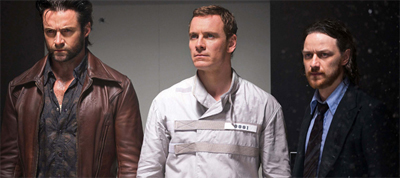
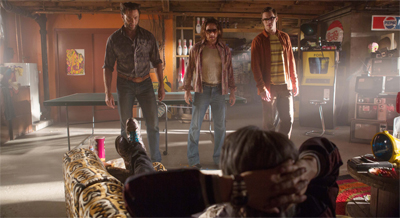
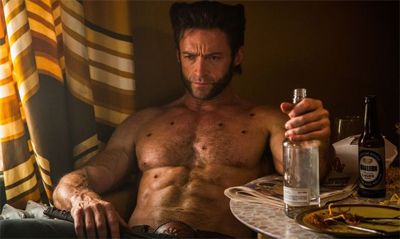
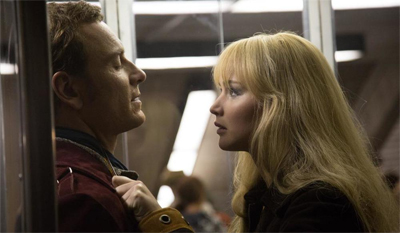
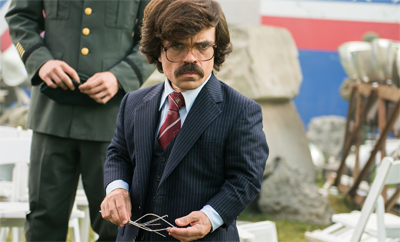
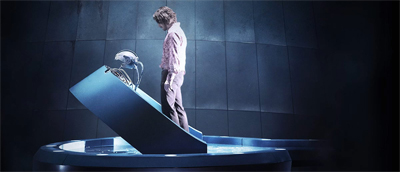

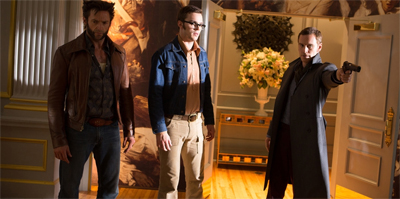

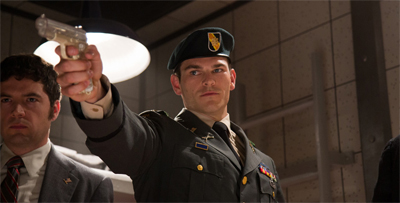





Reblogged this on Jessie Spencer's Blogspot.
Very interesting review as always.
I’m disappointed to hear the movie apparently invokes the same smug, mindless caricature of Nixon I would have thought ‘Frost/Nixon’ buried for good. He was an intensely flawed and in many ways deeply corrupt man but he was also an astoundingly complex figure – see Noam Chomsky’s and (of all people) George McGovern and their take on the man.
Does the film handle race and nationality as poorly as ‘First Class’? I remember finding the bland Americanisation of Banshee and Moira McTaggert deeply problematic and uncomfortable, especially as the villains kept many of their ‘identifiably foreign’ connotations.
Actually, now that you mention it, there is absolutely no reference to Quicksilver’s heritage. (In fact, the movie does present him as living in the suburbs and it’s “Peter” rather than “Pietro.” Hm. Strange I missed that.)
I do think that Nixon is a grossly simplified figure in pop culture – and particularly here – but I don’t mind it too much. After all, the film indulges in the romantic lionisation of John F. Kennedy, a character who was – in his own way – as complex and troubled as Nixon.
There is a very credible argument to be made – one that Mad Men makes quite eloquently – that the romantic and idealistic version of the sixties presented here never actually existed. “Camelot” was, after all, just a fantasy. But I think that Days of Future Past gets away with because it’s very much a fantastical alternate version of US history where the Cuban Missile Crisis involved mutants and JFK’s assassination may have involved mutants.
While romanticising a troubled era is definitely uncomfortable, I think that Days of Future Past tries to justify that by suggesting that it’s okay to use those stories to justify optimism and hope. It doesn’t matter that Camelot never existed – it mattered that people believed it could and tried to realise it. (After all, Days of Future Past suggests that the Xavier School itself never really existed either, its potential cut short by the Vietnam War. In which mutants were used as soldiers, much as Xavier himself uses the school to justify mutants as soldiers, if we’re feeling particularly critical of Xavier, like I think First Class was and Days of Future Past isn’t, oddly enough.) The same way that Star Trek is a product of the sixties and is quite often sexist and even racist, but that doesn’t mean the ideas behind Star Trek are flawed.
Regarding the race/nationality issues in ‘First Class’ I was actually more referencing the way that heroic Irish and Scottish characters had been ‘denationalised’ into generic Americans and how troubling I found that for a film nominally celebrating diversity especially giving the period it was set in.
That said I get your thinking and agree that ‘Star Trek’ is a good analogy here. I’ll probably go and see it anyway and hold my nose for cartoon Nixon.
No, I get your point about First Class and it’s well taken. I was observing that the same is arguably true here of Quicksilver, who is transposed from Eastern European Romani to suburban middle-class American.
(When I was speaking about romanticism of the sixties, it was more in response to the portrayal of Nixon, which is quite cartoonish, arguing that the sainted portrayal of Kennedy is also somewhat shallow – with Nixon/Kennedy working better as an exaggerated and fantastical dichotomy between the American pop cultural memory of the sixties and seventies than as any meaningful contrast of the realities of either era.)
Actually, Quicksilver himself hints at his parentage when he says to Magneto “So you can control metal, huh? My mom once knew a guy like that” in the Pentagon elevator. And witness his mother’s reaction when she watches Magneto on tv when he holds the White House hostage.
He does indeed. And Magneto’s very quick reaction suggests that there’s more than a grain of truth to his observation.
However, it isn’t his parentage that Ross and I were talking about. It was his ethnicity. Like there’s no indication that Sean Cassidy was Irish in First Class, there’s no evidence that Quicksilver’s mother isn’t American and his origins aren’t distinctly American and middle class.
Thank you for this fantastic review. It’s only been a day, but DOFP is becoming a film that bothers me more the more I think about, rather than growing on me. I think you make a great point about Singer just choosing what he wants, continuity be damned. The only way I’ve managed to reckon with this is that this film and First Class take place in a different universe/timeline than the two wolverine films and the original trilogy. Various similar events happen – Hank even supports this theory with his Quantum time river analogy, all converging towards similar points with slight changes – but the future in DOFP isn’t one that follows X3 or even X2 exactly. It’s the only way to make sense of it. Even between just the two films there are some issues – when does Xavier get around to converting his old war bunker and outsized cerbro aparatus into the shiny thing that is identical to the one from the first x-men – but for the most part things make sense.
Where I have more issues is DOFP as pop history, and internal narrative coherence within the film. The cuban missile crisis re-imaging I thought was wonderfully done in First Class. Here though, the JFK stuff feels very clunky. To begin with, it’s very unclear just how many people know about Magneto’s involvement. But you think that type of thing might have at least traveled through the mutant grape vine, so that Havok isn’t surprised. For that matter, even with the congressional committee making the reasonable point that mutants represent a tiny fraction of the population, you would think the fact that one of them assassinated the president and needs to be kept in a super secure secret prison would make people think that more such people would be a danger (how they apprehend him is grossly unclear).
It also has the disadvantage of making Magneto out of commission for 10 years. That means that the deaths of Banshee, Emma Frost, Angel Salvadore, and Azazel all happened in the two year period between the Cuban missile crisis and JFKs assassination. Which also means they would have happened under Kennedy’s watch (more on that in a moment). And speaking of Banshee, wouldn’t he more probably be with Xavier at this time? Why would he be Magento’s to grieve, as the vietnam war doesn’t fully escalate until the late 60’s, which is presumbably when students are being called up, mutants being weaponized (though how they are identified is unclear), and Xavier is unable to handle the overall psychic distress.
As for JFK, it doesn’t seem Magneto would consider him “one of us” if he was simply a human sympathizer, as in first class he already seems to have identified his feelings of pretty clear racial superiority. Maybe he’s a mutant with some level of seducing women or something,
The viral site The Bent Bullet is beautifully constructed but makes no sense whatsoever as it implies that a) Mystique, in the form of Oswald, killed JFK, then killed Oswald in the form of Jack Rudy, then gave Rudy quick acting cancer, but also decided to leave a message in the voice of Magneto for some reason and b) Magento has been in prison for 50 years. This last clearly contradicts Ian McKellen saying that he and Xavier had spent a long time fighting.
Of course, this is all nitpicking. And I’m glad they get basic character relations more right than historical specifics. But it is frustrating to see historical context thrown in as a cute device rather than making sense.
I can see that problem, regarding Magneto’s incarceration and the haziness around the death of his former students and acolytes. As you said, surely Banshee would have stayed at the Xavier Institute?
Personally, I just assume that Banshee was conscripted and killed in Vietnam as part of that mutant squad, and word crept down to Magneto during an occasional check-in or interrogation. And I can buy Magneto grieving Banshee, as part of his “suffering of the mutant race on my shoulders” kind of thing. I find it harder to believe that Xavier is shaken up by the death of Emma Frost and Azazal, two people who tried to murder children in his care.
(Although it’s weird how DOFP embraces the “St. Xavier” approach to the character, after First Class worked so hard to make Xavier a much more complex and questionable character than the version played by Patrick Stewart. Which is no diss on Patrick Stewart.)
With regards to the “long time fighting” between Xavier and Magneto, I assumed that Magneto escaped custody on his own at some point in the old timeline, just as Xavier must have eventually pulled himself together by himself, just a little bit later – to the point where he had a minimal impact on history so that the near future of Bryan Singer’s original X-Men could look plausibly like the world we inhabit, but with mutants.
But you’re right, it’s very hazy as to how many people know who Magneto is or what he’s done and the suggestion that mutants are a low-key problem strains credibility. After all, Magneto seemed quite unlikely to keep a low profile in his campaign for mutant rights, even if he was only active for a short time.
I’m not a Marvel comics fan (DC for the win) but could the grief over Emma dying be based more on fan fondness for her comics counterpart? Certainly the film version seemed lacking in any positive traits at all.
Maybe. The comics version of Emma Frost is pretty love her or hate her, depending on who is writing her and how much the reader likes arrogance as a defining character trait.
I don’t know, it’s hard not to feel a little sorry at the suggestion that somebody might have been executed and dissected (or even not executed and vivisected) by the government. Oddly enough, though, I can buy Magneto’s rage over it – even though they were two degrees of separation from the Nazis who killed his family. Equally, I can understand that the older and more mature version of Xavier would be haunted by it and stirred to action – but the way that it immediately snaps the younger disillusioned Xavier out of his funk feels weird. (One imagines it would have led to MORE drinking and idleness.)
Good review. I liked the film, I mean I have some problems from a total comic nerd point of view but yeah its good.
The visuals and 70’s timeline worked really well and the acting was really good. Quicksilver steals the show.
This wasnt greatness but Apocalypse might 😀
I’m looking forward to Apocalypse, but I am kinda hoping that we might get a bit more of a dystopian feel with the next one – the Age of Apocalypse and all that. I thought the bad future here felt like window dressing.
I know what you mean. It spent 1 minute i the beginning and then went to a temple and avoided the dystopian world 😦
Yep. Which is cool, but I was kinda wondering who was running this future. It’d make sense for the Sentinels themselves to be in command, but Wolverine refers to a government of bigots – but there’s no sense of civilisation or society outside that quick shot of mutants being herded.
I think the sentinels should have been sentient with voices. Would have been smarter. Am sticking to that view 😀
Interesting review, while I can appreciate the problems that you addressed, I can’t say that I agree with all of them. Sure the film doesn’t follow the comic completely, some characters get lost in the background and this film doesn’t reinvent the superhero genre or take a risks. But it does deliver a cohesive and fun superhero film that bridges the gap between two different generations of X-Men characters and rectifies the main mistakes of X3 and Origins. I feel like this film did a much better job at character balancing, story and future film set up than The Amazing Spider-Man 2. Also the fact that Wolverine has such a presence in this film is clearly because he’s the cash cow of 20th Century Fox and everyone lovesa bit of Hugh Jackman, but that being said its not like he overshadowed people like McAvoy, Fassbender and Lawrence.
I don’t mind about not following the comic. It’s an adaptation in a different medium. Changes have to made in order to tell a story in two hours instead of as part of a larger mythos.
I know the pragmatic reasons for Jackman being such a big part of the plot, and actually love Jackman as Wolverine (confession, he’s one of Marvel’s half-dozen perfect asting decisions for me, including Stewart, Fassbender, McKellen, Norton and Jackson), but I think he becomes a burden on an ensemble piece like this.
I had no intention of seeing this film,but as in the past you seduced me into it.Actually it has been beckoning to me at the discount theatre the last few weeks.Why? I have not seen any of the others, nor read the comic books.So I went in as a virgin.
I loved every minute of it. I read this film thru continental philosophy and Foucault’s demolishing linear,progressive,historical time saying that the world is ruled by EVENTS. And this film supports Foucault.But that moment when Raven has Trask in her sights at the end! Fassbender has told her the future is in your hands now and leaves, and we see her ambivalence:shoot or not?
The EVENT spirals out in waves into the world – think the JFK assassination – and there are consequences.But in that moment of Raven’s indecision we are confronted with Sartre’s Existential Choice, the Existential Moment of the individual within the Foucauldian Grid of the System.Of course this was also Foucault’s problem in taking on Sartre as a philosopher. X-Men Future Past has thrown it on the table again.To his credit Foucault understood this and at the end of his life was lecturing in Berkeley on Parrhesia – Fearless Speech.
Seeing this in the aftermath of Snowden, who has made a Foucauldian CUT into the Discourse of history, changing it in ways we can intuit might be consequences of it, is to heighten awareness of Zizekian Signs from the Future.He says we are to give these signs space, nurture them, allow them to shape the future.When we don’t we end up with Hitler, or someone in his mold.
That is some pretty thoughtful stuff. You’re dead right about that sequence with Raven and the gun – that is the defining moment. (And you’re also right about the JFK assassination. Although we don’t see it, it very clearly created ripples that define the seventies, both in the elements taken from the real world – Nixon! – and in the narrative itself – it leads to Erik’s capture and the symbolic shattering of any mutant utopian dream.)